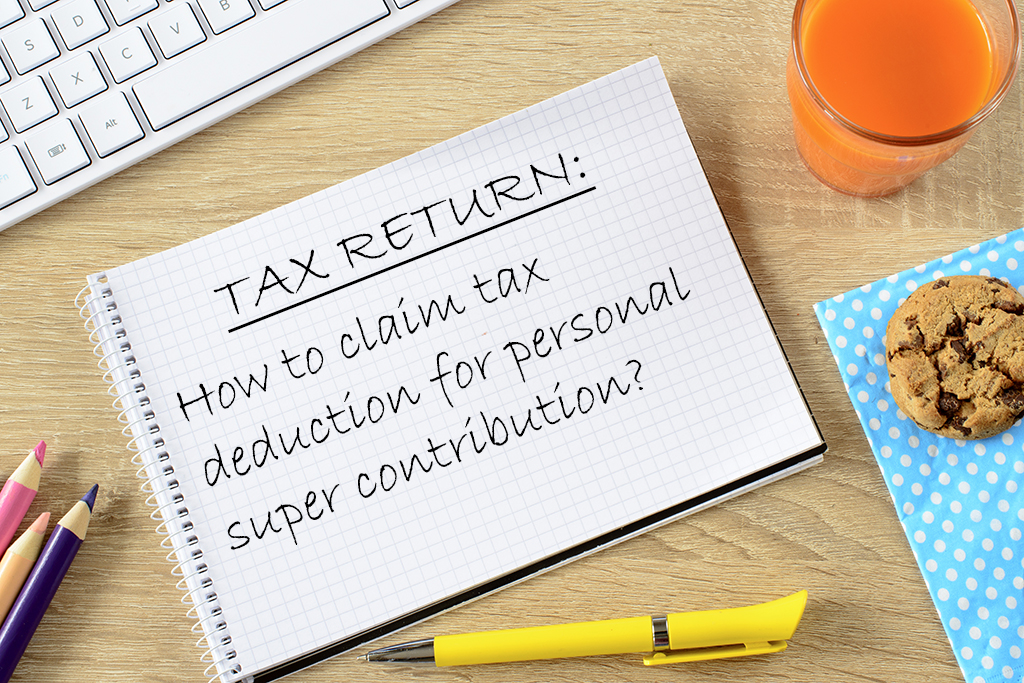To make your personal super contribution tax-deductible, you need to make sure you provided a Notice of Intent to claim a deduction for personal super contribution in the approved form to your super fund (Section 290-170 Notice).
After receiving and processing your Notice of Intent, your super fund will provide you a letter acknowledging receipt and acceptance of your notice and confirming the amount of super contribution you can treat as tax deductible for that year.
How do I provide a valid Notice of Intent to claim tax deduction for personal super contribution?
Most Superannuation Funds provide notice of intent to claim to claim a deduction for super contribution form in their own format. You may also use the generic form provided by the ATO, which can be downloaded from here.
You need to complete and send the notice to your Super Fund. Please do not send it to your Accountant or the ATO.
When do I need to submit the notice?
You must submit your Notice of Intent to claim deduction for personal super contribution by the earlier of:
- The day you lodge your Tax Return for the year in which you made a contribution.
- 30 June in the financial year following the year you made a contribution.
What is the maximum amount of tax-deductible super contributions in 2019?
Your maximum amount of tax-deductible super contribution in 2019 is worked out by subtracting the total amount of concessional super contributions paid by your employers on your behalf in that year (including compulsory super guarantee payments and reportable super contribution) from your concessional super contribution cap of $25,000.
Let’s say, for example, in 2019 financial year, your super fund received on your behalf:
- $12,000 of compulsory super guarantee contributions (at 9.5% of your ordinary time earnings)
- $6,000 of salary sacrificed to super (reportable employer super contributions)
- $8,000 of your personal superannuation contributions (made by yourself)
The amount of your personal contribution that can be tax deductible is worked out as:
$25,000 (Concessional Contribution Cap)
Less:
-$12,000 Employer Super Guarantee Payments
-$ 6,000 Salary Sacrifice
=$ 7,000 Claimable as a Tax deduction
In this example, you would be able to claim maximum of $7,000 of your personal super contribution as tax-deductible. You would need to submit Notice of Intent to claim deduction to your super fund indicating you will be claiming $7,000 as a tax deduction.
The remaining $1,000 will be counted towards your non-concessional contribution cap as an after-tax deduction.
Can I use my unused concessional contribution cap from prior years to increase my tax-deductible contributions in 2019?
The law has recently changed to allow taxpayers to carry forward their unused concessional contribution balances on rolling basis for up to five years.
The new carry forward rule applies from 1 July 2018, which means that if you do not use your $25,000 cap in full in 2019 financial year, you may be able to carry forward the unused portion to the following years. The first year, in which you will be able to take advantage of catch-up contributions is 2020, not 2019.
To take advantage of the carry-forward contribution rule, your Total Super Balance must be under $500,000 on 30 June prior to the year in which your catch-up contribution is made.
Note that the way the “carry forward” rule works is different to “bring-forward” rule, which applies to non-concessional super contributions. You cannot make extra concessional contribution in advance for future years.
What if I do not submit a Notice of Intent to claim a deduction for personal super contribution?
By default, your personal super contributions are treated by your super fund as after-tax contributions. If you do not advise your super fund of your intention to claim a deduction for your super contribution, it will continue to be treated as an after-tax contribution, which means it will be counted towards your non-concessional super contribution cap, and you will not be eligible to claim tax deduction for that contribution.
However, the unused portion of your concessional super contribution cap can be carried forward for up to 5 years, provided your Total super Balance does not exceed $500,000 at 30 June just before start of the year in which you make additional contributions.
I have realised that I exceeded my concessional cap in 2019 by making personal super contributions. Can I vary my Notice of Intent?
You can vary the amount of tax-deductible super contribution by giving your super fund a variation to your original notice. You need to fill a new Notice of Intent form stating the new amount of claim and placing an X in the “Yes” box to the question “Is this notice varying an earlier notice?”. You will need to provide this form to your super fund before you lodge your tax return for the year in which you made a contribution or before 30 June the following year, whichever is earlier.
Need Help?
Do you have any questions in relation to claiming deduction for your personal super contributions or working out how much you can contribute to minimise your tax? We are able to assist. Send us an enquiry or call our office.
Disclaimer: All the information provided on this website is of general nature and does not constitute tax, legal or financial advice. It does not take into account your personal circumstances and is not intended to replace consultation with a qualified professional.







